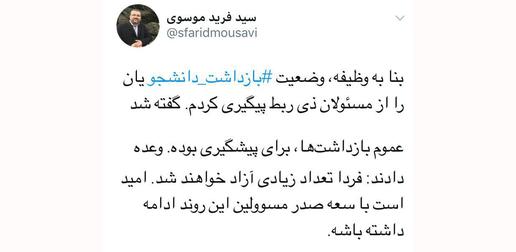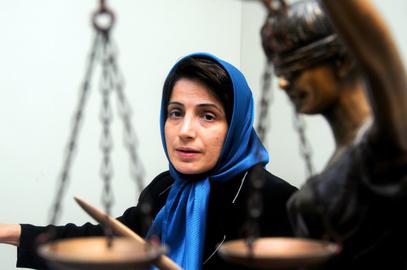Over the last few days, Iranians have gone on to Twitter to condemn authorities’ use of “preventive arrests” during the recent protests, insisting the practice was illegal under Iranian law.
Using the hashtag “preventive arrest” (#بازداشت_پیشگیرانه in Persian), many people responded to a tweet by Farid Mousavi, a member of parliament for Tehran. On January 6, he tweeted that while he was trying to track the fate of protesting university students, authorities had confirmed they had arrested many of them as a preventive measure and that they planned to release them within a day.
Parvaneh Salahshouri, another representative from Tehran, said that around 90 students had been arrested. She identified the intelligence ministry as the agency responsible for the arrests.
The families of those arrested in the protests have largely stayed silent. Informed sources say that a number of families have not been given any information about the arrests of their loved ones and that many of them have gathered outside the gates of Evin Prison on a daily basis hoping for news about them.
Reformist MP Mahmoud Sadeghi said that many of the arrested students had not actually been involved in the protests. Sadeghi added that little was known about at least 10 of the 90 students detained.
The renowned Iranian human rights lawyer Nasrin Sotoudeh is a tireless advocate of human rights and a defender of political prisoners. Despite having been persistently harassed and imprisoned herself, she has remained defiant, both inside prison and out.
IranWire talked to Sotoudeh about recent events in Iran, including the matter of preventive arrest.
Tehran representative Farid Mousavi has said that many students were arrested as a preventive measure. Does Iranian law allow authorities to arrest individuals before they have committed a crime?
In no well-rounded judicial system is arbitrary arrest to prevent crime allowed, even if it is ordered by a judicial authority.
To answer your question, I should point to Article 36 of the Iranian constitution, which clearly states: “Passing and execution of a sentence must be only by a competent court and in accordance with law.” It is followed by Article 37, which states: “Innocence is to be presumed, and no one is to be held guilty of a charge unless his or her guilt has been established by a competent court.” And according to Article 32, “No person may be arrested except according to and in the manner laid down in the law.”
And if an arrest does occur, it must follow certain steps, such as [the arrested person] being informed of the charges, [the arrested person being given] the chance to defend oneself and access to a lawyer. So the claim about preventive arrest does not agree with any article in the constitution or in the Islamic Penal code.
Might this member of the parliament be referring to the Law for the Prevention of Crime, which was passed by the parliament [Persian link]?
The Law for the Prevention of Crime was passed by the parliament in 2015. The law provides for the formation of a High Council for the Prevention of Crime. It sets down the duties of this council [that make it clear] that it is in no way considered to be a judicial authority. The duty of the council is to come up with national policies aimed at reducing crime, not to arrest people without due process of law and without the right to defend themselves — not to detain them for a few days and then tell them that they are free to go.
But the Islamic Republic has a history of these kinds of arrests.
Yes, it has happened throughout the last 40 years. People who have been subjected to such arrests and then have been found not guilty have not complained. I believe that after 40 years of such behavior from citizens, the government has come to believe that it can arrest people without cause and then tell them after a while: “We investigated and you have committed no offence.”
This process must be reversed, meaning that judicial authorities should only arrest individuals if there is enough evidence that a crime has been committed and that there is a danger that the accused might escape the law. In that case, if the offence is serious, the judge has the right to put the individual under temporary arrest. Unfortunately this process has been reversed and there is nothing lawful about it.
You mentioned that there must be due process of law when carrying out arrests. But authorities do not observe a number of legal protocols when conducting arrests. Families and detainees are also not aware of their legal rights. What are the protocols that authorities should be following?
The first thing that must be done is to immediately inform the family of the arrest. The detainee must be able to contact his or her family. The location of [where the accused was] detained and the charges must be clearly stated. The arrested individual must be given immediate access to a lawyer.
But in many arrests, these protocols are not observed and the accused and his family are put under pressure [by members of the security agencies]. And if the security pressures to which these individuals and their families are subjected continues, the main losers will be the families.
It has been reported that many of the families of those arrested over the last week or 10 days still do not know where their loved ones are being held, and they have been appealing to various authorities in an attempt to find out. At the same time, members of security agencies have warned families not to talk publicly about the issue. What is your take on this?
We faced similar problems in 2009 [after the disputed presidential election]. People had no news from their family members who had been arrested for quite a while. Only later did learn that they had been arrested.
I know about young people without any record of civic or political activities who have gone into the streets just because they are fed up, without any intention of joining demonstrations, and who have been arrested for one reason or another. Suddenly their families are faced with threats and promises from security forces, whose role in society has grown in recent years.
The natural reactions of these families is to protect their relatives by working out the problem with the security agencies. But I believe that no problem can be solved if we allow things to proceed outside the framework of the law. It might even put the families in danger. Therefore I recommend that the situation must be revealed through the media within the framework of the law and by relying on the right to free expression and the right to demand justice.
Going through the media gets you better results anywhere in the world, because when civil rights are involved they must be shared with the public in a loud voice. I believe the problem must be shared with the public because both the judiciary and the society are accountable for these arrests.
Do you have any clients who have been arrested in the course of recent protests?
When arrests are political the first problem is that the detainees are denied the right to a lawyer. As the first step [authorities] tell them not to demand a lawyer because it will make their situation more complicated. Then they tell the detainees to select from [a list of] lawyers that they present to them. But let me be very clear and say without any hesitation that a lawyer presented by the security forces or a security court is utterly unreliable.
Further down the road they even name lawyers that the detainee must not appoint. In recent arrests, intermediaries contacted me and asked me to represent a number of detainees. I wholeheartedly agreed and asked their families to contact me but they did not. I do not want to prejudge, but considering the current security atmosphere it is not farfetched for me to suspect that the families have been threatened or pressured not to contact my office or the offices of other independent lawyers.
When these things are taken together, conditions become such that the detainee is denied the chance for a fair trial.
visit the accountability section
In this section of Iran Wire, you can contact the officials and launch your campaign for various problems


























comments